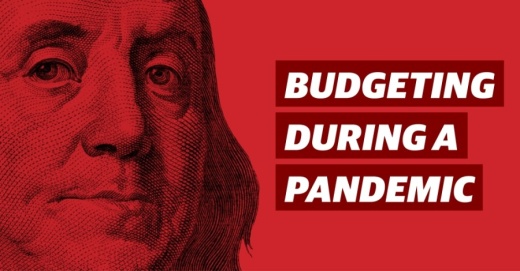While funding from the federal Coronavirus Aid, Relief and Economic Security Act has helped entities such as Oak Ridge North and Shenandoah, department budget requests and spending across the board have generally gone down to compensate for the lower revenue.
Among the cuts, The Woodlands Township is holding back on several new administrative positions in its fire department to save $285,000, and it is postponing discussions of a possible new arts center until hotel tax revenue improves.
“I think it’s a time to figure out a way to do more with a little less,” Director Bob Milner said at an August budget meeting.
The Woodlands budget cuts
Monique Sharp, The Woodlands Township’s assistant general manager for finance and administration, said she believes The Woodlands remains “financially strong” due to a diverse tax base and avoiding large expenses such as pensions and overtime costs.
The board of directors arrived at a proposed tax rate of $0.2231 per $100 valuation for the FY 2021, which was unanimously approved by the six board members present at the Sept. 10 meeting. The fiscal year in The Woodlands runs from January to December.
The proposed tax rate is also the no-new-revenue tax rate, or the rate needed to generate the same amount of property tax revenue as the previous year. The tax rate for FY 2020 was $0.2240 per $100 valuation. Each cent of the tax rate represents $2.11 million in revenue, according to information from the township.
The proposed budget allows for a tax rate decrease despite declining revenue from other sources during the pandemic. Sharp said in the township’s August budget meetings that FY 2020 has seen a 3% decrease in retail sales tax revenue, an 18.9% decrease in accommodation and food services revenue, and a 64.8% decrease in oil and gas sales tax revenue from the amounts projected for the year to date.
Although retail and food service revenues are down due to coronavirus-related closures, Sharp attributed the decline in oil and gas to the acquisition of Anadarko Petroleum Corp. by Occidental Petroleum Corp. and the headquarters subsequently leaving The Woodlands.
For the FY 2021 budget, Sharp said sales tax will continue to be a primary revenue generator, making up $54.5 million of the $129 million total budget, alongside $46.3 million in property tax revenue. Sales and hotel taxes and programs make up 64% of the township’s revenue sources, and 36% of the budget is funded by property tax revenue, according to a budget statement prepared by the township.“We have a 2021 budget that has flat revenue growth; we did see a $6 million decrease in expenditures; we are maintaining our reserve balances; and we continue to have low debt balances,” Sharp said. “In the end, what we have is a 2021 budget that reflects financial stability and budget flexibility to manage what are uncertain times as we go through the [coronavirus] pandemic.”
Among the expenses being cut for FY 2021 are capital projects, which are expected to decrease by $5.7 million compared to the FY 2020 budget. This decrease is due to previous capital projects having been completed, Sharp said. Visit The Woodlands, the township’s convention and visitors bureau, also proposed a $613,000 spending decrease compared to FY 2020.
The township board also did not rule out redirecting some of the $1.78 million it has slated for its contract with Alpha & Omega Mounted Patrol for mounted security around Town Center as part of its early August deliberations into other areas of public safety. Board members took varying stances on the patrol services, with some advocating for the sense of security the patrol brings and others saying funds could be more efficiently used elsewhere.
“When I was in the military in the late ’70s and ’80s, we had individuals that patrolled the perimeter fence 24/7, and today, they use drones to do that,” Milner said in the Aug. 5 meeting.Several proposed positions for the The Woodlands Fire Department were not approved for FY 2021, including proposals for a battalion chief with a salary of about $155,000 and a fire department lieutenant with a $129,000 salary.
Chair Gordy Bunch said that although Coronavirus Aid, Relief and Economic Security Act funds may be available for some costs, they cannot support long-term, ongoing expenses.
“I share that with the fire chief to make sure he understood,” he said. “We love you; [we] want to be as supportive as we can, but when you’re looking at a 3.5% revenue [cap], if you extrapolate these out, it paints a very different picture.”
Passed in the 2019 state Legislature, Texas Senate Bill 2 restricts municipalities from raising property tax revenue more than 3.5% than the previous year, and it will take effect in the next fiscal year. Property taxes in The Woodlands make up $46.3 million of the FY 2021 budget, up around $99,000 from the previous year due to new property not included in the 2020 tax rolls, Sharp said.
Oak Ridge North, Shenandoah adjustments
The cities of Shenandoah and Oak Ridge North also proposed either decreased or flat tax rates from the previous year. Due to coronavirus restrictions, both cities have seen a decrease in sales tax revenue this year.Shenandoah’s FY 2020-21 budget included a tax rate of $0.1799 per $100 of valuation, a rate lower than the no-new-revenue rate originally proposed. The approved rate matches what was approved for the previous year’s budget and is anticipated to generate around $9.5 million for the city’s revenue budget, down around $300,000 from 2019-2020.
Among the new expenditures for the upcoming fiscal year are $59,000 for a civilian code enforcement officer, which includes salary, benefits, vehicle maintenance, travel and training.
According to Shenandoah Council Member Mike McLeod, who spoke during the Aug. 12 meeting at which the budget was approved, the position will eliminate the need for an additional officer to the Shenandoah Police Department.
“Looking at the cost of a patrol officer, that [weighted] cost is around $81,000,” McLeod said. “It would have been well worth it. But our interim chief had another idea where we take code enforcement off of the backs of patrol officers and bring in a civilian position.”
McLeod said the new position will allow officers to focus on policing issues rather than code enforcement.
Despite the effects the coronavirus has had on retail and travel industries, the approved budget by the Shenandoah City Council still relies heavily on sales tax. Information presented to the council includes around $6.1 million in revenue generated from sales tax, which is around $200,000 less than last year. Sales tax provides nearly two thirds of Shenandoah’s annual revenue, according to city officials.
The Oak Ridge North City Council on Aug. 24 approved a slight decrease to the tax rate for the city in FY 2020-21 at $0.4712 per $100 of valuation, a 3.84% decrease from the FY 2019-20 tax rate. However, the new rate is the city’s voter-approved tax rate, or the highest rate that could be set without the possibility of a resident election. Budget information indicates property tax revenue is expected to generate 8.7% more revenue for the upcoming budget for a total of $956,736 compared to the $821,935 for FY 2019-20.
The rise in property tax revenue will help offset a 5% decrease in sales tax revenue for FY 2020-21, which the city projects will generate around $1.9 million of the city’s $3.2 million revenue.
The largest part of the budget is $1.8 million for police department expenses—41% of the total budget. Other major expenses include $996,000 for city administration.
Capital projects in 2020-21 include $765,000 for drainage projects; $335,000 for street, sidewalk and parks projects; and $311,000 for water and sewer system projects.
Statewide perspectives
The Austin-based Texas Municipal League, a nonprofit that provides services to Texas cities and officials, indicated cities across the state have seen revenue losses due to the coronavirus.
A TML midyear fiscal condition survey of municipalities in the state indicated out of 552 responding cities, around 67% reported they had lost sales tax revenue and 57% reported a decrease in hotel occupancy tax revenue.
According to September data from the state comptroller’s office, statewide sales tax allocations for FY 2019-20 were $34.1 billion, up 0.2% from the previous year. However, sales tax revenue in the month of August was still 5.6% lower for that month than it was in the previous year.
The same TML survey indicated the most widely used method of cutting budget costs was to postpone capital spending, as 22.2% of responding cities indicated. Hiring and wage freezes were the next two highest percentage of responses at 2.1% and 2%, respectively.
JJ Rocha, grassroots and legislative services manager for the TML, said this is the first year the organization has held a midyear fiscal condition survey, which was completed due to concerns over coronavirus and its effects.
“It is all very unique to each city with what they are going through,” Rocha said. “Their local economy is very different.”
According to Rocha, a primary concern expressed by cities is the loss of sales and hotel occupancy taxes will not be felt this year but in the future.
“It will be felt in the next two to three years,” she said. “Property tax bills are due Jan. 31. ... If we have foreclosures, it is going to be detrimental to the economy, and cities will have to face tougher budgets each year.”






